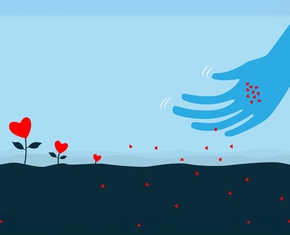The views expressed in our content reflect individual perspectives and do not represent the authoritative views of the Baha'i Faith.
“Mankind would rather commit suicide than learn arithmetic,” quipped the philosopher Bertrand Russell in the 1960s. Russell’s frustration came from people’s reluctance to think through the implications of accelerating population growth.
It took 10,000 generations for the human population to reach 1 billion, at around 1800 AD. Yet in just six more generations it hit two billion, at around 1925. Reaching the next billion threshold, in 1960, took two generations. After that, reaching each of the next billion marks took less than one generation.
The human population now sits at around 7.2 billion. By the end of this century, it will likely hit 11 billion, according to the United Nation’s Population Division.
That’s a lot of people, but the human population only represents half the story. The other half involves the accelerating population of our stuff. Our livestock, for example, outnumber us at least three to one. Estimates put the number of Earth’s buildings at 1.7 billion. We operate 1.2 billion motor vehicles. As the population increases so do our roads and bridges and power plants and oil wells and other infrastructure, as well as thousands of factories and all the consumer goods they produce.
The impact of all these things contributes to the human ecological footprint, a measure of our collective impact on the natural environment. Taking everything into consideration, experts say humanity’s footprint now exceeds Earth’s capacity to support humankind in a sustainable way by 60 percent.
But we are just getting started. If our population does reach 11 billion by 2100, and annual Gross World Product quintuples as projected, from $50 trillion today (in constant 1990 dollars) to $250 trillion, our ecological footprint would exceed Earth’s biocapacity by 500 percent. That means it would take the equivalent of five planets to support us.
If you have a general awareness of global environmental problems, you likely already felt rather discouraged about human prospects for the future before reading this. Given these observations, despair would seem justified. But we can look at this situation in another way: The very nature of the problem creates the conditions that will trigger solutions.
As the problems deepen, the implications of the present social-ecological order will become even more obvious. On the ecological front, we see highly destructive super storms, rising global temperatures, a tragic loss of biodiversity, and crippling water shortages. On the economic front, we see national and international financial crises and extreme and accelerating inequality. On the social front we see extremism, civil war, refugee crises and mass migrations, plus an epidemic of problems like depression and addictions. These issues have become so immense that they challenge the foundations of world order.
The impacts of these systemic global problems—unprecedented in their nature—will inevitably force us to examine our core values as individuals, communities and institutions. That examination can, in turn, lead to profound social shifts. Climate change, in particular, represents an ultimate challenge to humanity, a forcing agent that demands transformation. Naomi Klein sums it up in the title of her recent bestseller, This Changes Everything—to deal with climate change we will literally have to change civilization.
In the 19th Century, Baha’u’llah anticipated the global crises humanity now faces. Observing the excesses of a then-emerging industrial civilization, he wrote:
If a thing is carried to excess, it will prove a source of evil. Consider the civilization of the West, how it hath agitated and alarmed the peoples of the world… The purging of such deeply-rooted and overwhelming corruptions cannot be effected unless the peoples of the world unite in pursuit of one common aim and embrace one universal faith.
Strange and astonishing things exist in the earth but they are hidden from the minds and the understanding of men. These things are capable of changing the whole atmosphere of the earth and their contamination would prove lethal. – Tablets of Baha’u’llah, pp. 68-69.
In assessing world conditions–social, political, economic and ecological–Bahaullah attributed the problems facing humanity primarily to its disunity, manifest in fundamental problems in the social order:
The winds of despair are, alas, blowing from every direction, and the strife that divideth and afflicteth the human race is daily increasing. The signs of impending convulsions and chaos can now be discerned, inasmuch as the prevailing order appeareth to be lamentably defective. – ibid, p. 171.
Many of these conditions worsened through the 20th Century, further exposing fundamental flaws in the old world order. But Baha’u’llah went further, stating, “Soon will the present-day order be rolled up, and a new one spread out in its stead.” He envisioned a New World Order that would be built on values of unity, justice, equality, and sustainability, which would lead to “an ever-advancing civilization.”
Baha’u’llah compared humanity to an individual who moves through stages of infancy and adolescence toward maturity. Just as a human being inevitably passes through different stages of development, the old order would give way as humanity moved into a stage of maturity, characterized by a global ethos of oneness. As a result, the Baha’i teachings view human unity as the necessary precursor to resolving our big problems.
In writing my book Eleven, I identified 15 signs that support this sense of optimism about the future. In the following series of articles I’ll explore a number of these signs and build a case that, despite clear threats to civilization and the ecosphere, in the long term the future of humanity and the planet looks bright.
You May Also Like
Comments


















Says the song